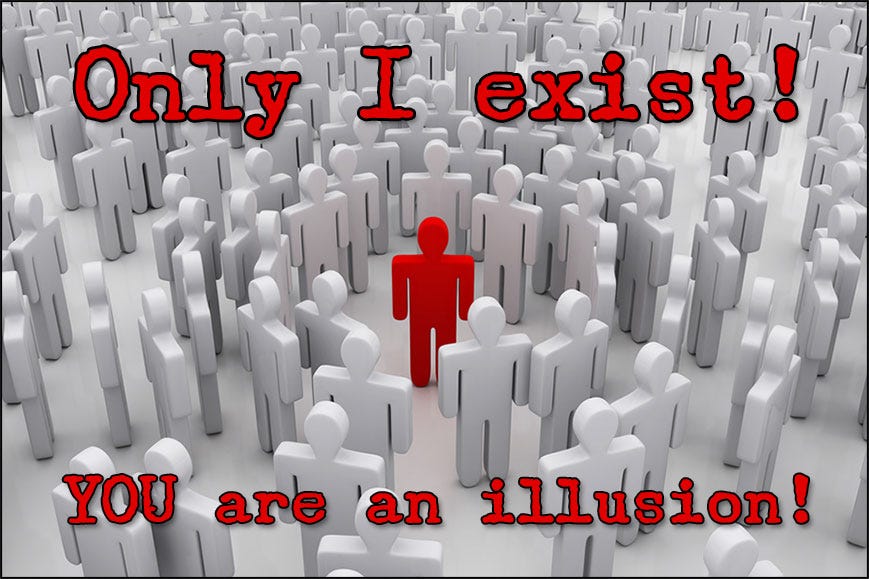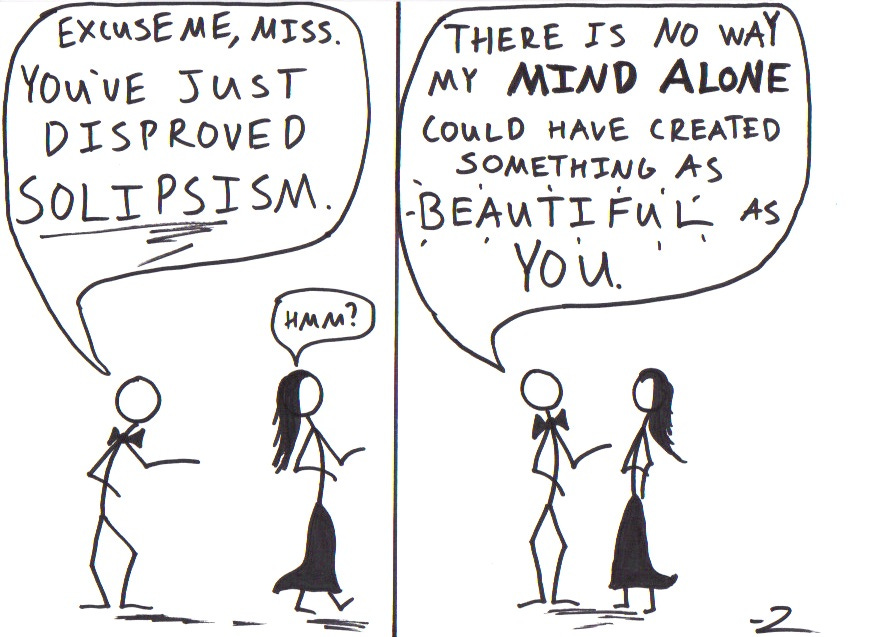Solipsism>>Determinism
I have long believed in what philosophers call “libertarian free will.” This isn’t about political philosophy, but philosophy of mind. Holding all physical conditions constant, determinism holds that there is exactly one thing that I can do.* Libertarian free will holds, in contrast, that there is more than one thing that I can do. Not “in a manner of speaking,” or “given imperfect information about physical conditions,” but literally, genuinely, truly.
On my view, for example, I am, holding everything else in the physical world constant, able to write this post… or not. I am writing this post because I freely choose to do so.
Note: Libertarian free will is a modal claim — a claim about what can happen. Even if I drive to school on the same route every day, I have free will if I can choose a different route — or a different destination. The same goes for determinism; it’s not a claim about what does happen, but what must happen.
Doesn’t libertarian free will contradict the physics textbook? As far as I can tell, yes. Physics textbooks almost never even mention the existence of beliefs, pain, or minds, much less acknowledge that minds have free will. Yet I remain extraordinarily confident that I have free will in this sense.
A large majority of my smartest friends insist that determinism is true. Physics textbooks say so, basic logic (“Every effect must have a cause”) says so, and they say so. Who am I to disagree?
My answer begins with a truism: The foundation of science is repeated, careful observation. If scientists are allowed to dismiss piles of repeated, careful observations as “illusion,” there is no science.
Next step: I have a lifetime of repeated, careful observation of my own mind. Via introspection, I directly observe myself making genuine choices in every waking moment.
Therefore: Any “scientific” theory that contradicts these observations is, at best, incomplete.
You could reply: None of your mental observations are publicly observable, so science can’t take them seriously. But this begs massive epistemic questions. Starting with: Before anyone can say that anything is “publicly observable,” they must first solve the Problem of Other Minds, to show — despite their lack of telepathy — that someone in addition to yourself is conscious. Question: If your own introspection doesn’t definitively show that you’re conscious, how on Earth are you supposed to show that anyone in addition to yourself is conscious?!
Which brings us to my philosophical line in the sand. As Descartes famously aphorized: “I think, therefore I am.” My own mental existence is indubitable. Even when I think, “Maybe I don’t really exist,” I am ipso facto thinking and existing. The physical world, in sharp contrast, is dubitable. I can readily imagine that that my mind is the only thing that actually exists, and everything else is just an illusion created by my own mind.
As usual with weird philosophical ideas, “My mind is the only thing that actually exists” has a name: solipsism. And while I don’t believe solipsism, the view has one big point in its favor: Solipsism does not ask me to disregard my most indubitable observations. Determinism, in contrast, does.
To be fair, you could be a determinist and a dualist at the same time. Saying roughly:
Beliefs, pain, and other mental states indubitably exist, and introspection is the sole way to verify their existence. But mental states are epiphenomenal to physics, and still governed absolutely by the laws of physics. So while your mental states cannot be illusory, your sense that you freely choose anything is pure illusion.
But this position still asks me to disregard a lifetime of first-hand mental observation because it contradicts a theory based purely on observation of physical objects. Which is a deeply unscientific request.
A few of my friends with hard science backgrounds flatly deny that they experience anything like free will. But as far as I can tell, their denials are totally theory-driven. “I don’t experience such things because science says such things can’t exist.” Most such friends, in contrast, admit that their experience matches mine. But they hew to the “Free will is an illusion” position, stubbornly refusing to wonder, “Why not just say the same about any observations that indicate that existing scientific theories are false or incomplete?” Which, given their position, they should totally wonder.
(To be a little Zen: This reminds me of day my twins were born. When the obstetrician asked me, “Who will perform the circumcisions?,” I bit my tongue rather than acerbically ask, “Are there any other healthy body parts you think we should amputate?”)
I’ve been arguing about philosophy since the 80s. Free will versus determinism. Solipsism versus “the external world exists.” And I’ve got to say: While both solipsism and determinism seem crazy to me, there are degrees of crazy. In math slogan form: Solipsism>>Determinism. In English: Solipsism is crazy, but determinism is totally crazy.
P.S. Isn’t it also crazy to imagine I’m going to change anyone’s mind on free will versus determinism? Fairly crazy, but it still fun to try every few years just to stay in practice.
* Or, in the quantum variant, that there is exactly one distribution of what I can do. Same difference.




When I prompt ChatGPT, I observe the text it outputs. But I don't observe the process that generated that text. For all I know, the process is deterministic, even if *I* can't see why it couldn't have generated some other text.
When I think to myself "Should I cook or order in?" I'm aware of the choice I end up making (I'll cook, let's say) but similarly, I don't observe the underlying neural process that generated that choice. So even if, for all I can tell, in that exact moment I could've made a different choice, that's no more evidence that my brain processes are genuinely indeterministic than it is with ChatGPT.
And the same thing can be said about the "prompt" of asking myself what to have for dinner. I'm not aware of any deterministic processes that caused that to be the question that popped into my head when it did. But it's a total non sequitur to conclude that, therefore, none exist.
Basically, I don't see why you think the evidence of introspection bears one way or the other on the question about the nature of the underlying processes that ultimately determine (or merely influence!) what makes it into consciousness.
What you seem to be presupposing: that you have simply observed that you have done one thing when you could have done another, with all conditions being exactly the same. I.e., that you have simply observed a modal fact, in the way that one might observe a desk or a drop of rain. I would dispute that you have observed any such thing.
I do agree that you have observed yourself making genuine choices. But to assume that this is evidence for libertarianism is just to assume that compatibilism is wrong. That’s the subject of much debate, with most philosophers thinking that assumption is false, and almost no philosopher thinking it is something that one can just assume without detailed argument.